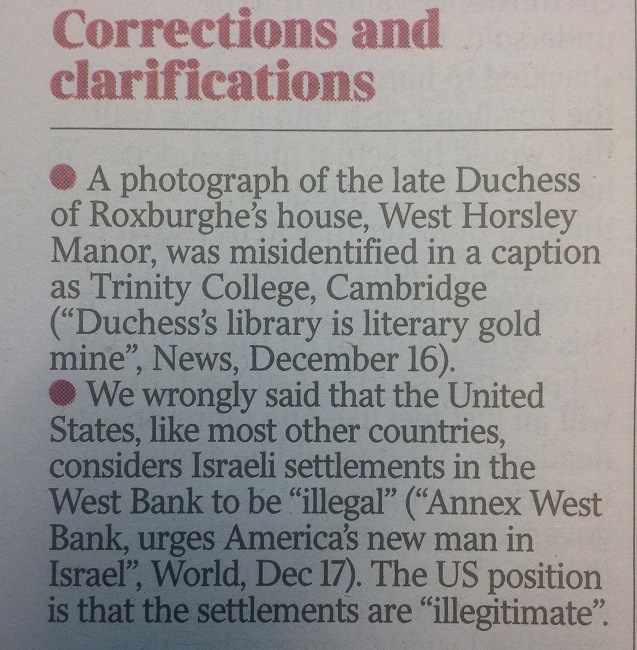.@glcarlstrom US does NOT describe settlements as “illegal”. They say “illegitimate”. See recent AP correction https://t.co/JEP0gwcOYI
— UK Media Watch (@UKMediaWatch) December 17, 2016
JERUSALEM (AP) — In a story Nov. 16 about Israel’s settlement policy, The Associated Press reported erroneously that the United States considers Israeli settlement construction in the West Bank to be illegal. While the United States opposes settlement construction, it does not take a position on its legality. Instead, it says that settlements are “illegitimate,” ”corrosive to the cause of peace” and “raise serious questions about Israel’s ultimate commitment to a peaceful negotiated settlement with the Palestinians.” Most of the international community views the settlements as illegal.
The fact is that the US position on settlements (and the wording used to condemn such activity) has been consistent for roughly thirty-five years. In the early 80s, the Reagan administration reversed Jimmy Carter’s position that the Israeli settlements were illegal, saying: “As to the West Bank, I believe the settlements there — I disagreed when the previous Administration referred to them as illegal, they’re not illegal” (New York Times, Feb. 3, 1981).
Subsequent U.S. administrations – through Obama – have maintained the same position. Though they’ve obviously disapproved of Israeli construction across the green line, they did not label them as “illegal”.
A perfect example of this continuity in US policy since Reagan was seen in 2011, when then Secretary of State Hillary Clinton called Israeli settlements “illegitimate” before the US vetoed a UN Security Council resolution condemning Israeli settlements as “illegal”. As CNN reported at the time, “The Obama administration has been critical of Israeli settlement construction but has not gone as far as to call it ‘illegal.’”
Secretary of State John Kerry used the exact same language as Clinton.
On Sunday morning, we contacted Times of London editors concerning Carlstrom’s claim, noting both the specific AP correction and the broader context outlined above. This morning, they informed us that the article had been amended.

